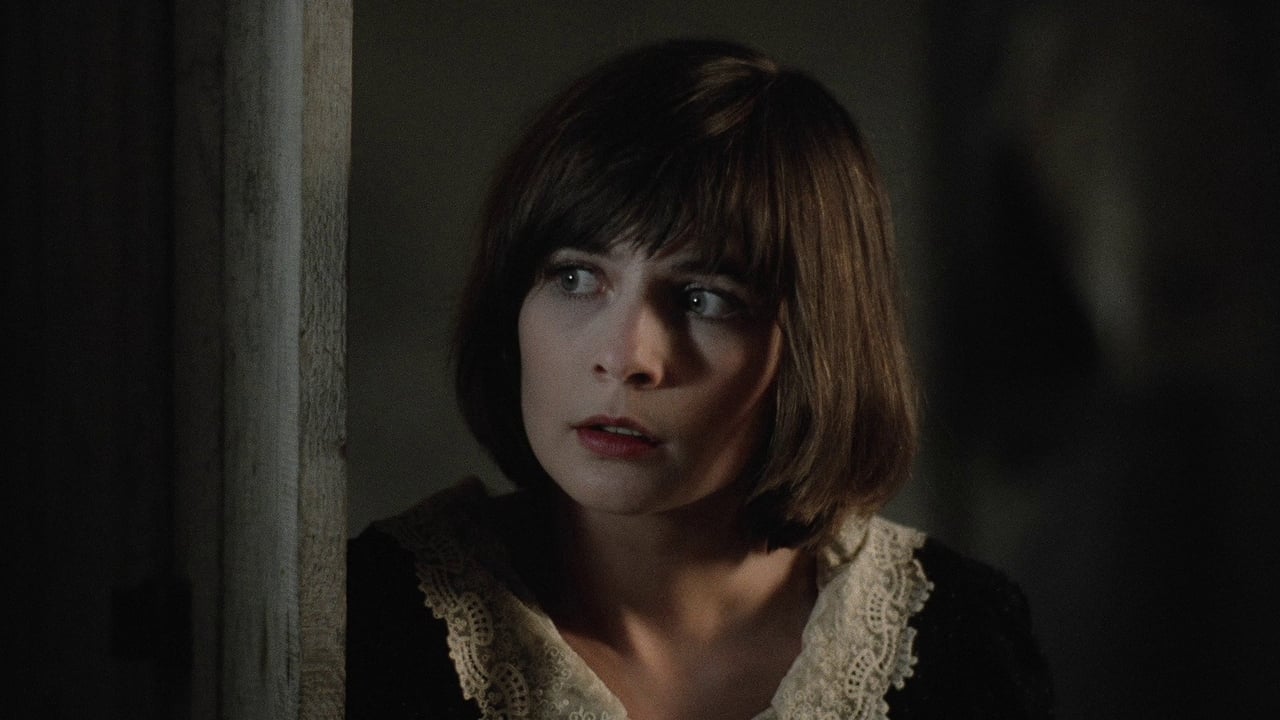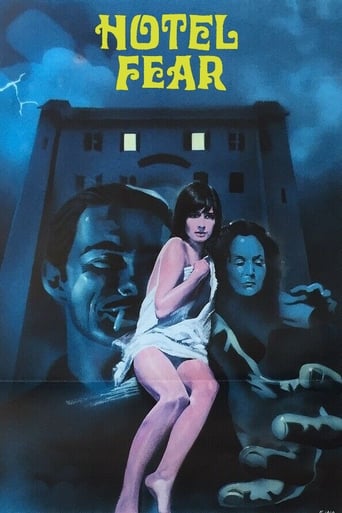

Long neglected Gothic Giallo from Francesco Barilli that is entirely undeserving of such treatment. I have noticed that Luc Merenda is generally given short shrift as an actor, which is something I've never truly understood, but even his skeptics might be in for a pleasant surprise here, as he really delivers an excellent performance as a sleazebag, rapist Lothario replete with a righteous scumbag 'tash and oily, slick-backed barnet. Mention must be made of the excellent score by Adolfo Waitzman who creates a subtle sense of fear and degeneracy to the Gothic proceedings. For me personally this film is a truly great discovery and one more needlessly obscure Italian thriller that towers above much of the tedium produced today.
... View MoreFrancesco Barilli had already proved a great talent for creating a nightmarish atmosphere with his most famous film "Il Profumo Della Signora in Nero" (1974), and while that film is a true gem I liked his second Giallo, "Pensione Paura" of 1977 even more. With only few murders and an obscure storyline that is not mainly concerned with a murder series, "Pensione Paura" is no typical example for the Giallo-genre, but an incredibly moody one. Set in a guest house in rural Italy in the final stages of WW2, "Pensione Paura" maintains a thick and nightmarish atmosphere that makes the film seem like a gloomy fever dream at times. Beautiful yet incredibly eerie, the film oozes a constant atmosphere of doom that is intensified by beyond demented characters and a magnificent score that stands out even in the good company of Italian genre soundtracks.When World War 2 nears its end, Rosa (Leonora Fani) and her mother Marta (Lidia Biondi) are keeping their eerie old guest-house open for a bunch of demented guests, among them the sleazy and sinister playboy Rodolfo (Luc Merenda), as well as Marta's lover (Francisco Rabal) who is hiding out from someone. Rosa, who is eagerly awaiting her father's return from the war is writing letters to him on a daily basis... Giving too much information about the plot would spoil a part, which is why my plot description ends here. As in any Giallo, of course, there is a series of murders involved, and the beautifully but decaying old rural guest-house is the eeriest setting imaginable. Leonora Fani is great in her leading role of the innocent teenage girl, a character it is easy to feel and be scared for. The rest of the characters are almost entirely demented, and the performances are great. Regular Italian cult leading-man Luc Merenda ("Torso", "Milano Trema", "L'Uomo Senza Memoria",...) is brilliantly sinister in his sleaziest role as the pencil-mustached womanizer Rodolfo, who has an older girlfriend but is also pursuing the innocent young Martha. The great Spanish character actor Francisco Rabal ("Dagon", "Nightmare City",...) is equally great."Pensione Paura" is a fantastic example for the atmospheric power of Italian Horror film. Without showing anything explicitly 'horrible' in the first half, the film maintains an eerily beautiful and uniquely nightmarish atmosphere of pure gloom from the very beginning to the very end. The remote rural setting with the gloomy guest-house and the nearby picturesque village create a menacing mood of seclusion and being lost. The brilliant score by Adolfo Waitzmann must be one of the most mesmerizing ever. While the film is not very gory by Italian Horror standards, it is completely uncompromising. I am not sure why Francesco Barilli regrettably has not directed many more films that were released in cinemas, a possible explanation could lie in the lack of gory and spectacular murders in comparison to the films other Italian Horror/Giallo masters. Overall, "Pensione Paura" is a must-see for anyone interested in Eurohorror, Giallo and Cult-Cinema. Very Highly Recommended!
... View MoreThis an interesting giallo from the director of "Perfume of the Lady in Black". It has a period World War II setting and greatly resembles the Salvatore Samperi film "Scandalo". The story centers on a mother (Lidia Bondi) and daughter (Leanora Fani), who are trying to run a pensione (hotel) after their husband/father has disappeared while fighting in the war. The mother is hiding her army-deserter lover (Francisco Rabal) in the attic while Fascist soldiers are encamped nearby. Meanwhile, a perverted couple staying at the hotel, older woman (Jolene Fierro) and her studly younger lover (Luc Merenda), are conspiring to get their slimy hands on the teenage daughter. This latter subplot is especially reminiscent of "Scandalo", but where the mother was the main protagonist there, the daughter is here, and this eventually takes a decidedly gialloesque turn with a series of mysterious murders. The ending is also quite different (and actually kind of ridiculous).The historical setting makes this somewhat unique as a giallo, but it's quite possible this movie was merely aping "Scandalo" there. It's principal strengths though are definitely Luc Merenda and Leanora Fani, who also appeared together in "The Last Round". They have similar roles here as, respectively, a handsome but vicious brute and his young, seemingly vulnerable victim. Merenda usually rates below other handome, more famous Italian leading men like Franco Nero (who was in "Scandalo") and Fabio Testi, but he was actually better than either when it came to playing an out-and-out villain. Leanora Fani was similarly underrated as an actress. She was one of the many Italian "lolitas" of the era, but unlike a lot of the others (Gloria Guida, Eleanora Giorgi, etc.) she actually looked like a teenage girl (even though she wasn't), and she generally specialized in playing vulnerable victims as opposed to predatory vixens.Francisco Barilli does a good job of creating a dark, moody atmosphere. The off-the-wall ending topedoes any real pretensions this movie might have had to be a serious historical drama like "Scandalo", but it certainly succeeds as a giallo (where bizarre endings are common). I actually thought this was better than Barilli's somewhat overrated "Perfume of the Lady in Black". It's definitely worth a look.
... View MoreThis is the second film I've watched from little-known director Barilli; like the first the slightly superior THE PERFUME OF THE LADY IN BLACK (1974) it can be labeled an arty horror film though, frankly, there's much more of the former than the latter this time around! In fact, it's set during World War II in a downtrodden Italian hotel run by a woman (whose husband is a flyer) and her innocent young daughter.Apart from the somewhat wasted Francisco Rabal (as a partisan informer hiding out in the titular hotel and a paramour of its owner), the casting looks rather unimpressive on paper but, surprisingly, we get a couple of excellent performances from the two nominal leads 23-year-old Leonora Fani (as the harassed daughter who is an object of desire to several of the hotel's guests!) and an unheralded sleazy turn from usual 'good guy' Luc Merenda (as a shady stud living off a rich mature keeper). Both Merenda and Fani are involved in several nude scenes and, in the latter's case, looking much younger than her true age makes for some disturbing viewing (particularly her rape by Merenda himself witnessed by the latter's mistress and by which she's visibly aroused!).The film has a memorably sinister soundtrack by one Adolfo Waitzman which may best be suited to accompany a bona-fide giallo, but it certainly elevates the end product considerably; the composer's name didn't register with me at first, but a quick check on his IMDb resume' soon revealed him to also be the man behind the music for (at least) two other significant "Euro-Cult" efforts Jess Franco's THE OTHER SIDE OF THE MIRROR (1973) and Claudio Guerin Hill's A BELL FORM HELL (1973). Also notable in PENSIONE PAURA, the film's original title, is the atmospheric lighting where the adoption of various color gels for disquieting effect was, in all probability, directly influenced by Dario Argento' contemporaneous classic of supernatural horror SUSPIRIA (1977).As with most efforts from this genre, the major liability would have to be its deliberate pacing however, since the film is a mood-piece first and foremost, I guess it was to be expected and, well, unavoidable. Still, the shock moments (when they come) certainly deliver the goods with the most effective being the double axe-murder of Merenda and his lover (with its slimy aftermath), and the last-minute rescue of the heroine (about to be victimized yet again) which turns into a machine-gun massacre of the hotel's entire guest list by an as-yet unidentified character (soon revealed to be a partisan companion of Fani's reportedly deceased father). The latter scene actually leads immediately into the unexpected and ambiguous conclusion which seems to be a particular thorn with most viewers discussing the film on an Italian forum; then again, a happy ending would have been highly unlikely for an essentially somber piece such as this! Until the fairly recent Italian DVD release, this was considered a very rare item even on its home turf; hopefully, the film's reputation will soar in future even though it's one the director himself seems not to like much at all (undeservedly, if you ask me)!
... View More